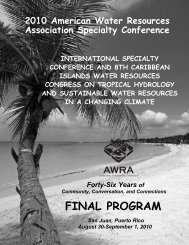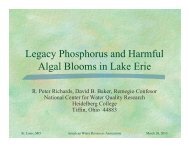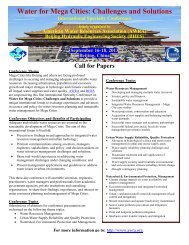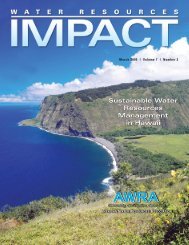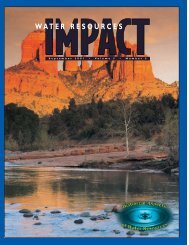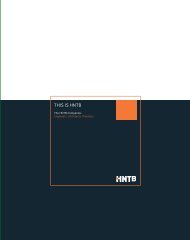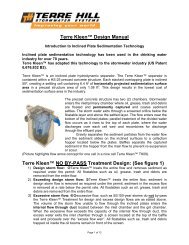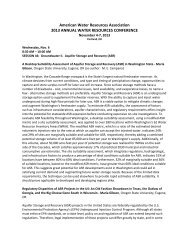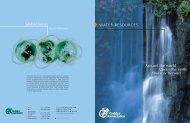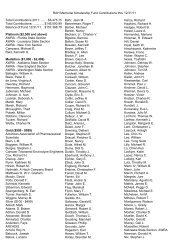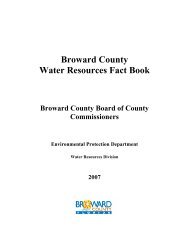N ovember 2 0 0 0 ⢠V olume 2 ⢠N umber 6 - American Water ...
N ovember 2 0 0 0 ⢠V olume 2 ⢠N umber 6 - American Water ...
N ovember 2 0 0 0 ⢠V olume 2 ⢠N umber 6 - American Water ...
Create successful ePaper yourself
Turn your PDF publications into a flip-book with our unique Google optimized e-Paper software.
MTBE: THE WATER-POLLUTING GENIE EPA<br />
KNOWINGLY LET OUT OF THE BOTTLE<br />
Tom Randall<br />
Carol Browner, U.S. Environmental Protection Agency<br />
Administrator, complimented the Senate Environment<br />
and Public Works Committee during the closing days of<br />
the final session of Congress for considering a bill to<br />
phase-out the water-polluting gasoline oxygenate methyl<br />
tertiary-buty ether (MTBE). Her statements echoed her<br />
comments of May 20, months after EPA’s "Blue Ribbon"<br />
panel found MTBE to be a serious threat to water quality:<br />
Threats posed by MTBE to water supplies in many<br />
areas of the country are a growing concern. Action by<br />
Congress is the fastest and best way to address this problem."<br />
There are several disturbing aspects to Browner’s<br />
new opposition to MTBE use, which has now polluted<br />
ground water in 31 states, as well as the solutions being<br />
entertained.<br />
EPA KNEW ALL ALONG<br />
Browner made the water-polluting properties sound<br />
like a new finding that was unearthed by her panel,<br />
which was hastily assembled after Democratic Governor<br />
Gray Davis ordered a phase-out of MTBE use in California.<br />
The fact is, the problem was known by the agency as<br />
early as 1987 – three years before it succeeded in lobbying<br />
Congress for an oxygenate mandate<br />
in the Clean Air Act (CAA) of 1990.<br />
In 1988 EPA notified its regional offices<br />
and state agencies that MTBE was<br />
a growing threat to the nation’s water<br />
supply in its Bulletin, "Cleanup of Releases<br />
From Petroleum USTs [underground<br />
storage tanks]," EPA/530/UST-<br />
88/001, dated April 1998.<br />
In that 1998 warning, EPA said,<br />
“. . . only about 10 percent of U.S. gasoline<br />
contains MTBE.” However, they said<br />
the chemical is already “among the top<br />
50 chemicals produced in the United<br />
States. MTBE is extremely soluble in<br />
water . . . Because of its high solubility,<br />
MTBE is easily transported in groundwater away from<br />
the spill site."<br />
It also noted, “The health effects of MTBE are generally<br />
poorly understood, especially at low levels. It has<br />
been classified as an irritant, a possible central nervous<br />
system depressant and, formerly, as having medicinal<br />
value.” Today, ten years after the CAA oxygenate mandate,<br />
various studies have indicated such diverse effects<br />
as carcinogenic potential and possible testicular degeneration,<br />
but EPA has still not taken action to definitively determine<br />
the health effects of the chemical it touted to reduce<br />
auto emissions.<br />
In spite of the compelling<br />
reasons for ending the use<br />
of MTBE, doing so<br />
without removing the<br />
oxygenate mandate entirely<br />
could cause even higher<br />
gasoline prices and greater<br />
nationwide shortages of<br />
supply than those seen in<br />
the Midwest this summer<br />
BUT LET THE POLLUTION SPREAD<br />
As mentioned at the outset, MTBE is now found in<br />
the ground water of 31 states, even though the oxygenate<br />
mandate applies to only a few densely-populated urban<br />
areas that EPA has ruled out of attainment for clean-air<br />
standards. Illinois and Michigan are good examples of<br />
this paradox, though others are plentiful.<br />
In Illinois, oxygenates are required only in the Chicago<br />
metropolitan area and near St. Louis – and it has been<br />
largely assumed by the public and most elected officials<br />
that the oxygenate used is ethanol, made from corn,<br />
since Illinois lies in the heart of the corn belt.<br />
However, MTBE has been found in the water supplies<br />
of 25 localities throughout the state, leading to the shut<br />
down of wells in several communities.<br />
In Michigan, which has no areas where the use of<br />
oxygenates is required, the state’s legislature found their<br />
MTBE pollution sufficiently widespread to pass a phaseout<br />
of MTBE by June of 2003, which Governor John Engler<br />
signed into law this summer.<br />
The spread of MTBE pollution throughout the country<br />
was made inevitable by three realities of the petroleum<br />
industry which EPA was either unaware or chose to<br />
ignore.<br />
The first is the fact that a refinery can make only one<br />
type of distillate at a time. Therefore, if<br />
it is making a blend stock, or basic<br />
gasoline type, for use with MTBE, it<br />
cannot make, at the same time, a blend<br />
stock distilled for use without MTBE.<br />
Changing from one blend stock to another<br />
is both time-consuming and costly<br />
in an industry that is currently running<br />
at 97 percent capacity.<br />
Secondly, the only way to efficiently<br />
ship petroleum products over long distances<br />
is via pipeline. Pipelines ship<br />
various products, one behind the other,<br />
which creates some co-mingling and<br />
does not permit convenient drop off of<br />
one product here and another there between<br />
closely-drawn geographical areas.<br />
Lastly, pure, unblended ethanol cannot be shipped<br />
through pipelines (according to industry experts), because<br />
it combines with water (always present in pipelines)<br />
and cannot be separated from it (MTBE is a product<br />
of the refining process).<br />
Therefore, in the Illinois-Michigan example, in which<br />
a group of refineries near Chicago produce gasoline for<br />
that area (where oxygenates are mandated) and also produce<br />
gasoline for Michigan, it is inevitable that what goes<br />
into the Wolverine Pipeline to Michigan will often be gaso-<br />
V<strong>olume</strong> 2 • N<strong>umber</strong> 6 <strong>Water</strong> Resources IMPACT • 3



